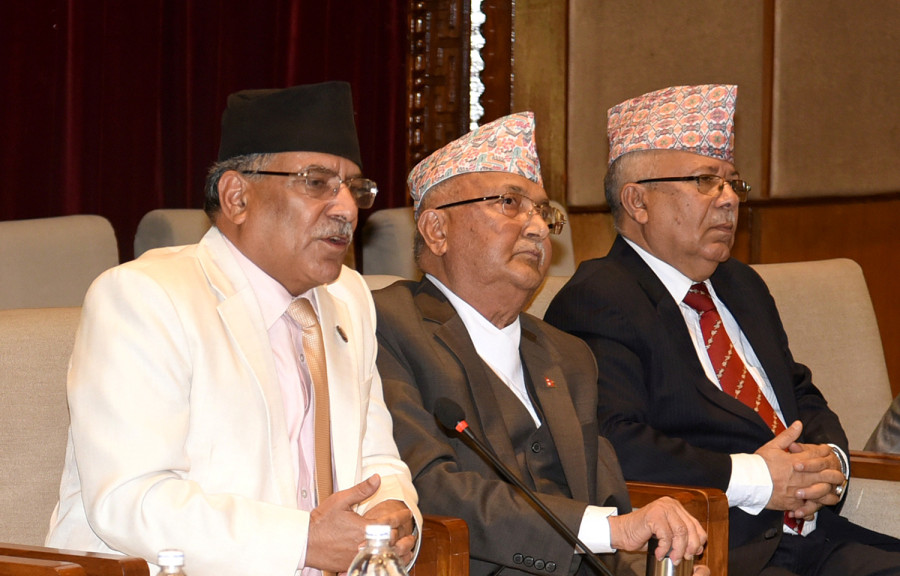Politics
The spectre of factionalism from UML days is haunting the Nepal Communist Party
Leadership should work to turn challenges into opportunity, ruling party insiders say.
Tika R Pradhan
A little over a year after its formation, the Nepal Communist Party is finding itself at a crossroads, and leaders say that while the party has an opportunity to evolve as a united force, it also faces the risk of falling into a factional quagmire. This, however, is not because of the feud between leaders of the former CPN-UML and the Maoist party, which announced their merger in May last year.
Leaders say the spectre of factionalism from the UML days is now haunting the Nepal Communist Party (NCP). Even though the party was struggling to complete its unification process by appointing leaders in districts committees, organisations and departments, leaders, leaving aside some quibbles, had appeared largely united. There were political manoeuvrings, but the situation has not gone out of hands until two weeks ago.
[Related Story: Debate on order of precedence takes centre stage in the ruling party]
But some quick developments in recent days, at the behest of Co-chair KP Sharma Oli with the backing of his Co-chair Pushpa Kamal Dahal, left a senior leader Madhav Kumar Nepal, who led the UML for 15 years as general secretary, worried.
Relegation to the fourth position in the party by the leadership that promoted Jhala Nath Khanal, also a former chairman of the UML, to the third position, prompted Nepal to register a seven-point note of dissent.
Now, Nepal is demanding that the leadership stick to the system, implement it from the leadership to the grassroots levels and correct ad-hoc decisions.
On Thursday, hours before Oli flew to Singapore for medical treatment, Nepal and Oli had a verbal altercation, which insiders say is indicative of a bigger problem. There used to be disagreements, but they used to remain within the confines of the party but situations have changed, they say.
[Related Story: Row lingers in ruling party over ‘one leader, one responsibility’ issue]
“Things are gradually unfolding and they are spilling out into the public domain,” said Ghanashyam Bhusal, a standing committee member. “Now this should build pressure on the leaders to resolve outstanding issues and abide by certain procedures.”
After Khanal’s elevation to the third position in the party and Bamdev Gautam's to the post of vice-chairperson, calls are already growing that Bhim Rawal, Asta Laxmi Shakya and Yubraj Gyawali, who were elected vice-chairs in the UML, be brought into the secretariat, where junior leaders like Bishnu Poudel and Ishwar Pokhrel have been accommodated.
But if Rawal, Shakya, Gyawali and Bhusal are promoted, former Maoists will also seek their space, according to Narayan Kaji Shrestha, spokesperson for the Nepal Communist Party.
“By demanding that the leadership correct their decisions, Nepal was asking to correct those decisions that allowed juniors to move up the ranks,” Shrestha told the Post. Asked if the leaders’ rankings would be rearranged as per Nepal’s demand, Shrestha said: “I cannot say anything at this point of time.”
But there is widespread concern in the ruling party that if the existing settings are revised to address the seniority row, it could lead to more disagreements.
“Nepal has already told the party secretariat that he would take his note of dissent to lower-level party committees if the leadership fails to address his concerns,” said Beduram Bhusal, a standing committee member who has close relations with Nepal. “If that happens, it will further escalate the existing internal conflict.”
Bhusal, however, believes the party should be able to find opportunity in current challenges. “If the leadership takes the emerging scenario as a lesson and acts accordingly,” said Bhusal, “it will be a step in the right direction.”
Related Stories:
- There’s a semblance of calm in the ruling party, but the storm is not over yet
- Oli and Dahal present a unified face, butcracks are visible all over the ruling party




 21.12°C Kathmandu
21.12°C Kathmandu















